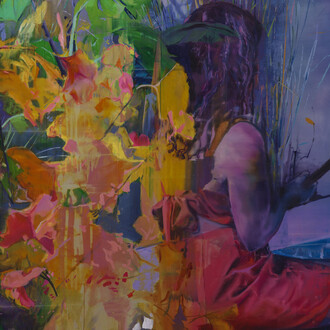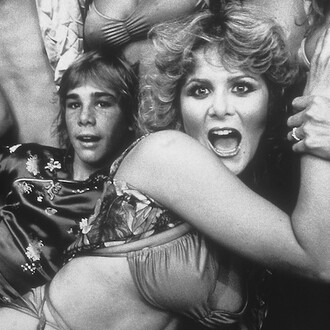Music has always been an integral part of the African American experience in America; documentaries on the civil rights movement, for example, often highlight important albums or concerts of the time. And for many, learning about African American history has been animated by listening to jazz, R&B, and hip-hop. Amidst the fighting and frustration of the 1965 Watts Rebellions to the aggravation of the 1992 Los Angeles Uprisings, the radio played on, broadcasting music by African Americans such as Horace Tapscott, Sam Cooke, Elaine Brown, and Charles Wright, and later Ice Cube and Tupac. Trouble Every Day: LA 1992 by reflecting upon the music of civil rights struggles, from the discord of Watts to the tensions of South Los Angeles. Named after Frank Zappa's iconic song "Trouble Every Day" - written in Echo Park in response to the Watts Rebellion - the installation also documents how Los Angeles's narratives seeped into the homes and radios of Americans nationwide.
Inside a recreation of a traditional late 1980s–early 1990s living room, footage of the 1992 Uprisings streams on television. Before websites like YouTube and Facebook, households experienced live events via breaking nightly news, most often in their living rooms. Here, the television is playing footage of decayed, burning neighborhoods and blurred young faces of pent-up fury, revealing to the rest of the world on live TV scenes that bore no resemblance to the harmonious cultural and racial landscape many associated with Los Angeles. In the background, visitors hear a soundtrack to the times, including selections from The Watts Prophets’s album "Rappin' Black in a White World" (1971) and rapper Toddy Tee’s "Batterram" (1985), West Coast hip-hop's opening salvo against police brutality in African American neighborhoods, whose title refers to the device deployed on homes that were often later proved drug-free.
West Coast music was documenting social injustices long before Rodney King's beating by LAPD officers was documented on tape in 1991. Inner-city kids were infusing hip-hop—a genre birthed in the Bronx in the late 1970s—with hardcore, LA-centric rhymes about gangs and the crack-addled neighborhoods around them. In 1992, following the acquittal of the four LAPD officers charged with King’s beating, riots broke out in Los Angeles. In this atmosphere, rapper Ice Cube released "We Had to Tear this Mutherfuker Up," in which he juxtaposed the clash between white authorities and frustrations of local minorities in urban areas. His song not only narrates the story of the acquittal, it also exhibits the conflict between gangsta rap culture—known to the mainstream as much for its vulgarity as for its politics—and a historically brutal LAPD culture.
The music born of the very conditions that precipitated the uprisings now transcended South Los Angeles, giving its once-marginalized music sudden legitimacy, and major labels began signing and promoting West Coast artists such as Snoop Dogg and Tupac Shakur. For better or for worse, the Southland gangsta rap style changed the trajectory of pop music by becoming the 1990s definition of “cool.” In addition, the televised revolution in LA made it clear to even suburban fans that rap lyrics weren't merely outlandish fictions set to hard beats; they were rooted in the bitter reality that LA was a two-tier city with gross inequities and a legacy of housing discrimination, unemployment, and poor educational opportunities.
Aimed at capturing the sentiments felt by many during the Watts Uprising and LA Riots, Trouble Every Day: LA 1992, focuses on the cultural aftershocks of the pivotal events in 1965 and 1992 and exemplifies how music, dialogue, and community celebration help us address racism in our city and nation.
















